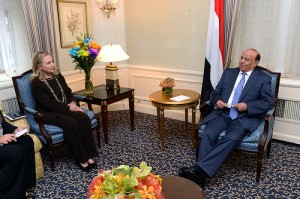President Abed Rabbo Mansour Hadi of Yemen told the Washington Post this week that his office and the Yemeni military fully cooperate with US counterterrorism efforts in his country, a frank admission that his predecessor was not willing to provide:
Hadi’s comments mark the first time he has publicly acknowledged his [...]]]>
 President Abed Rabbo Mansour Hadi of Yemen told the Washington Post this week that his office and the Yemeni military fully cooperate with US counterterrorism efforts in his country, a frank admission that his predecessor was not willing to provide:
President Abed Rabbo Mansour Hadi of Yemen told the Washington Post this week that his office and the Yemeni military fully cooperate with US counterterrorism efforts in his country, a frank admission that his predecessor was not willing to provide:
Hadi’s comments mark the first time he has publicly acknowledged his direct role in a campaign of strikes by U.S. drones and conventional aircraft targeting an al-Qaeda franchise that is seen as the most potent terrorist threat to the United States.
“Every operation, before taking place, they take permission from the president,” Hadi said in an interview with reporters and editors from The Washington Post in his hotel suite in the District. Praising the accuracy of the remotely operated aircraft, he added, “The drone technologically is more advanced than the human brain.”
Hadi’s enthusiasm helps to explain how, since taking office in February after a popular revolt ended President Ali Abdullah Saleh’s 33-year rule, he has come to be regarded by Obama administration officials as one of the United States’ staunchest counterterrorism allies.
….U.S. Special Operations drones patrol Yemen from a base in Djibouti, on the Horn of Africa. The CIA aircraft are flown from a separate facility on the Arabian Peninsula whose location has not been publicly disclosed.
Arab regimes mistakenly thought that autocracy, not democracy, was critical for fighting terrorism and that Western support for human rights in Arab countries would dilute such an effort. Because Arab autocrats were pliant partners, western governments, unfortunately, became addicted to autocracy, which in turn helped autocrats become more entrenched.
In the Inside Story Americas segment linked to above, the two former U.S. officials agree with investigative journalist Jeremy Scahill that their government’s approach to Yemen (and Pakistan) is fraught with problems and could easily lead to serious blowback such as terrorism against U.S. targets, but claim there’s not much else that can be done. Is that really what U.S. foreign policy in the Middle East is about? Doing something that you know does more harm than good because you can’t think of anything better? Scahill, who has been traveling in and out of Yemen on assignment over the past two years had this to say:
We are actually making America less safe in our response in Yemen right now …. Our own policies, the drone strikes, the support for a corrupt regime, the lack of any substantial funding for civilian infrastructure … then all the money that’s needed for counter-terrorism, supporting military units in Yemen that are perceived as being the Saleh family military rather than the national military has sparked a response of blowback where you now have a situation that people who would not have been inclined to support al-Qaeda are actually joining with the AQAP in a kind of marriage of convenience to rise up against the central government.
Earlier in the month Grenier also argued in an AJE op-ed that the U.S. may be turning Yemen into a mini-Waziristan through drone attacks that kill civilians:
One wonders how many Yemenis may be moved in future to violent extremism in reaction to carelessly targeted missile strikes, and how many Yemeni militants with strictly local agendas will become dedicated enemies of the West in response to US military actions against them. AQAP and those whom it trains and motivates to strike against civilian targets must continue to be resisted by the joint efforts of the civilised world. But the US would be wise to calibrate its actions in Yemen in such a way as to avoid making that obscure and relatively limited and containable threat into the Arabian equivalent of Waziristan.
But despite these warnings, the U.S.’s drone warfare on Yemen is escalating, with AJE reporting at least 24 drone strikes in 2012 so far that have killed dozens. Too bad for Yemeni villagers and their families who suffer the consequences regardless of whether or not they are directly targeted, and Yemeni children who are starving at an atrocious rate. Too good for Al Qaeda operatives who welcome U.S. actions that assist their recruiting efforts. And yet, there’s nothing else that we can do…
]]>